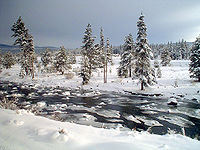
Photo from wikipedia
Abstract Institutional narratives are a discursive form of power where people engage in the development and promulgation of narratives that connect descriptions of how institutions work with arguments for particular… Click to show full abstract
Abstract Institutional narratives are a discursive form of power where people engage in the development and promulgation of narratives that connect descriptions of how institutions work with arguments for particular courses of action. This paper uses the concept of institutional narratives to analyze how the family farm as a social construct is used as a normative mechanism for meaning making around agricultural intensification and rural sprawl. We examined narratives among residents in the lower Fox River and Green Bay Watersheds of Wisconsin surrounding growth and change and the problem of poor water quality, which occurs primarily through excess phosphorous loading, and identified two institutional narratives among stakeholders, each with different framings of key problems related to water quality. The first narrative problematized agricultural intensification and the second problematized rural sprawl, yet both narratives relied on a societal construct of the family farmer as a cornerstone of ideal rural institutions and an indicator of how change ought to occur. Findings demonstrate ways in which notions of idealized rural community life are politicized though narratives that connect rural problems such as water pollution with normative claims about who has the right to inhabit and use rural spaces.
Journal Title: Journal of Rural Studies
Year Published: 2020
Link to full text (if available)
Share on Social Media: Sign Up to like & get
recommendations!